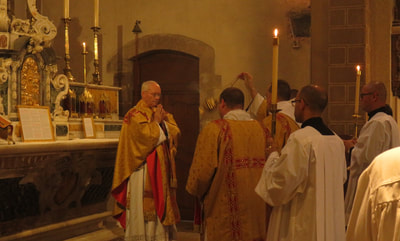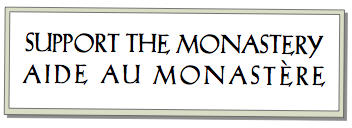+ In entering the Temple in Jerusalem, Our Lord encountered traders—something not as outrageous as we might first think, because animals had to be obtained for sacrificial offering. And yet His anger was palpable. Driving them out he uttered (we may reasonably presume he shouted): “My house is a house of prayer, but you have made it a den of robbers.” Domus mea domus orationis est. “My house is a house of prayer.”
It is not clear exactly why, but St Benedict seems to have encountered problems with behaviour in God’s house amongst his monks. For he finds it necessary thus to legislate in chapter 52 of the Rule: “Let the oratory be what its name implies, and let nothing else be done or kept there. When the Work of God is finished, let all go out in deep silence, and let reverence for God be observed, so that any brother who may wish to pray privately be not hindered by another’s misbehaviour. And at other times also, if anyone wish to pray secretly, let him go in simply and pray; not in a loud voice, but with tears and fervour of heart. He, therefore, who does not behave so, shall not be permitted to remain in the oratory when the Work of God is ended, as we have said, lest another should thereby suffer hindrance.”
St Benedict’s teaching on private prayer here is noteworthy and refreshing, predating the innumerable ‘methods’ that emerged in the later centuries dominated by what is called the devotio moderna. St Benedict proposes the devotio antiquior, as it were: prayer “with tears and fervour of heart.” It is a ‘method’ of prayer well worth adopting!
Returning to Our Lord’s words in the Temple and to St Benedict’s teaching, thankfully we can say that traders and even badly-behaved monks are found less frequently in churches in our own times. It has to be said, though, that if Our Lord or St Benedict came across some of the behaviour in churches today (and that of clergy in particular) and experienced some of what they purport to be appropriate worship (be that the stale fruit of a so-called liturgical creativity that is itself an indictment of the lack of ritual depth of many of the reformed liturgical rites, or the indifference and syncretism put to the fore in what occurs under the pretext of “ecumenical” or “inter-faith” services, or be it the use of churches as meeting halls or secular concert venues) their words would be strong and clear: Domus mea domus orationis est. “My house is a house of prayer.”
They would insist on this not because they are inappropriately rigid or closed to other good and necessary activities. No, they would insist on the utter sacredness of places of worship precisely so that God’s House would be nothing other than His, a place where we render unto Him that worship that is His due to the best of our ability and where, “if anyone wish to pray secretly [he can] go in simply and pray…with tears and fervour of heart.”
Let us be clear: this is not some medieval Romanistic adjunct to the Christian faith that distorts is pure essence. No: it is of the very essence of Judaeo-Christian faith which worships the One True God who has revealed Himself in human history and who has become Incarnate in Jesus Christ, the Unique Saviour of all mankind. That is why Our Lord purified the Temple of its corrupt traders. That is why St Benedict insists that the Oratory of the monastery be nothing other than precisely that: a house of prayer. That is why, from her very origins, the Church has richly adorned the spaces set aside for Christian worship and why, the world over, Christian architects have given generously of their inspired creativity to build wondrous houses for its worthy celebration.
Christianity is not a merely something internal or intellectual—as essential of course as our dispositions, resolutions and understanding are. It is fundamentally incarnational: our bodies and our souls are one in this life and we need the consolation and literally the edification (that is the formation and the lifting up of our hearts, minds and souls) that liturgical spaces and rites and things give us. A bell is just a bell. But it becomes the very voice of God when it rung before an Office and calls us back to that recollection of eternal truths which is so necessary in the midst of our mundane activities. Stones are mere stones. But when they are cut and arranged so as to provide a space in which the worship of God may worthily be celebrated, they become living stones that enable us to experience and enter into His Truth, His Goodness and His Beauty, even if we must so often do battle with much that is false, evil and ugly both in ourselves and in the world.
We are privileged this morning, as we have been for just under four years now, to partake of these goods in a building that has served this purpose for more than a thousand years. Let us not forget, though, that the ideologies of godless men reigned here for more than 200 years: generations of dens of robbers made gleeful use of this very space for their own ignoble purposes. Let our gratitude at the privilege of having restored it to the worship for which it was built, which we now carry to the altar, include the resolve ever to resist anything that would diminish it or abolish it once again. In this holy place let it ever be true that hanc domum domus orationis est. +
It is not clear exactly why, but St Benedict seems to have encountered problems with behaviour in God’s house amongst his monks. For he finds it necessary thus to legislate in chapter 52 of the Rule: “Let the oratory be what its name implies, and let nothing else be done or kept there. When the Work of God is finished, let all go out in deep silence, and let reverence for God be observed, so that any brother who may wish to pray privately be not hindered by another’s misbehaviour. And at other times also, if anyone wish to pray secretly, let him go in simply and pray; not in a loud voice, but with tears and fervour of heart. He, therefore, who does not behave so, shall not be permitted to remain in the oratory when the Work of God is ended, as we have said, lest another should thereby suffer hindrance.”
St Benedict’s teaching on private prayer here is noteworthy and refreshing, predating the innumerable ‘methods’ that emerged in the later centuries dominated by what is called the devotio moderna. St Benedict proposes the devotio antiquior, as it were: prayer “with tears and fervour of heart.” It is a ‘method’ of prayer well worth adopting!
Returning to Our Lord’s words in the Temple and to St Benedict’s teaching, thankfully we can say that traders and even badly-behaved monks are found less frequently in churches in our own times. It has to be said, though, that if Our Lord or St Benedict came across some of the behaviour in churches today (and that of clergy in particular) and experienced some of what they purport to be appropriate worship (be that the stale fruit of a so-called liturgical creativity that is itself an indictment of the lack of ritual depth of many of the reformed liturgical rites, or the indifference and syncretism put to the fore in what occurs under the pretext of “ecumenical” or “inter-faith” services, or be it the use of churches as meeting halls or secular concert venues) their words would be strong and clear: Domus mea domus orationis est. “My house is a house of prayer.”
They would insist on this not because they are inappropriately rigid or closed to other good and necessary activities. No, they would insist on the utter sacredness of places of worship precisely so that God’s House would be nothing other than His, a place where we render unto Him that worship that is His due to the best of our ability and where, “if anyone wish to pray secretly [he can] go in simply and pray…with tears and fervour of heart.”
Let us be clear: this is not some medieval Romanistic adjunct to the Christian faith that distorts is pure essence. No: it is of the very essence of Judaeo-Christian faith which worships the One True God who has revealed Himself in human history and who has become Incarnate in Jesus Christ, the Unique Saviour of all mankind. That is why Our Lord purified the Temple of its corrupt traders. That is why St Benedict insists that the Oratory of the monastery be nothing other than precisely that: a house of prayer. That is why, from her very origins, the Church has richly adorned the spaces set aside for Christian worship and why, the world over, Christian architects have given generously of their inspired creativity to build wondrous houses for its worthy celebration.
Christianity is not a merely something internal or intellectual—as essential of course as our dispositions, resolutions and understanding are. It is fundamentally incarnational: our bodies and our souls are one in this life and we need the consolation and literally the edification (that is the formation and the lifting up of our hearts, minds and souls) that liturgical spaces and rites and things give us. A bell is just a bell. But it becomes the very voice of God when it rung before an Office and calls us back to that recollection of eternal truths which is so necessary in the midst of our mundane activities. Stones are mere stones. But when they are cut and arranged so as to provide a space in which the worship of God may worthily be celebrated, they become living stones that enable us to experience and enter into His Truth, His Goodness and His Beauty, even if we must so often do battle with much that is false, evil and ugly both in ourselves and in the world.
We are privileged this morning, as we have been for just under four years now, to partake of these goods in a building that has served this purpose for more than a thousand years. Let us not forget, though, that the ideologies of godless men reigned here for more than 200 years: generations of dens of robbers made gleeful use of this very space for their own ignoble purposes. Let our gratitude at the privilege of having restored it to the worship for which it was built, which we now carry to the altar, include the resolve ever to resist anything that would diminish it or abolish it once again. In this holy place let it ever be true that hanc domum domus orationis est. +






























 RSS Feed
RSS Feed


